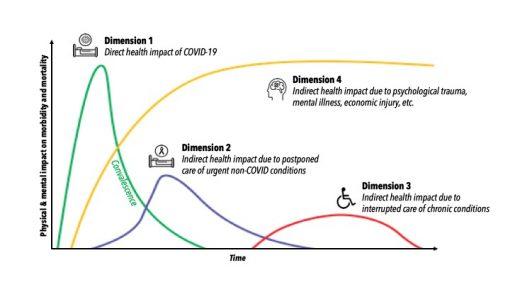2021 - 2025 | Federal Funding
Promotor
Researchers
Collaborator
Project website
About the project
HELICON is developed to support the BRAIN-be Pillar 3 Federal societal challenges (BELSPO) and aims to unravel the long-term (in)direct health impact of the COVID-19 crisis in Belgium. The HELICON consortium is a multidisciplinary team from the Department of Epidemiology and Public Health at Sciensano, Institute of Health and Society (UCLouvain), Department of Public Health and Primary Care (UGent) and -of course- Interface Demography (VUB).
Context
The spread of the Severe Acute Respiratory Syndrome Coronavirus 2 (SARS-CoV-2) and the resulting outbreak of the disease COVID-19 has faced Belgium and most other countries worldwide with unprecedented challenges. The COVID-19 crisis has a multidimensional impact on population health, occurring at different time scales and affecting different population groups. The direct impact of COVID-19 on public health comprises an immediately visible part (e.g., hospitalisations and deaths), but possibly also a long tail of long-term recovery and complications (Dimension 1). Beyond the peak of the immediate COVID-19 health impact, the impact of postponing non-urgent primary and hospital care (Dimension 2) and of interrupted care for chronic conditions (Dimension 3) will gradually become visible. At a broader level, the impact of mental health challenges and social and economic injury will start to become evident, possibly over many years to come (Dimension 4).
To fully understand the burden of this crisis on our society, it is necessary to study the short-term impact, as well as the medium- and long-term consequences of the COVID-19 crisis on the health and well-being of the Belgian population. The use of different sources of administrative data play an important role in this respect, as they make it possible to analyse the evolution of population health (inequalities) during, just after the crisis and in the longer term.healthcare

Objectives
Despite the wealth of information on the current, immediate impact of COVID-19, several knowledge gaps remain on the other dimensions of the COVID-19 crisis impact. To address these knowledge gaps, HELICON aims to fulfil three research objectives:
– Identify socio-economic and sociodemographic factors of risk and resilience through the assessment of the social patterning of COVID-19 testing, infection, hospitalizations and mortality.
– Describe the medium- and long-term direct health impact of COVID-19 infections with regard to healthcare use after COVID hospitalization.
– Assess the indirect health impact of the COVID-19 crisis in terms of non-COVID morbidity and mortality and the health economic impact of delayed health care use.
Throughout the project, four guiding principles will be respected – i.e., valorisation of routine administrative health data sources, evaluation of social differentials, evaluation of differentials across the different epidemic waves, and knowledge translation and policy transfer.
Impact
The immediate impact of HELICON will lie in the generation of new scientific knowledge on the long-term and indirect impact of the corona crisis, and the social inequalities therein. As a secondary objective, HELICON will assess the validity of routine administrative data sources for research on novel health threats such as COVID-19. These findings will have implications for the valorisation and management of administrative health data collections. In the medium and long term, HELICON aims to have a significant impact on policy and public services, with expected gains in terms of health and economic development.
HELICON is developed to support the BRAIN-be Pillar 3 Federal societal challenges (BELSPO) and aims to unravel the long-term (in)direct health impact of the COVID-19 crisis in Belgium. The HELICON consortium is a multidisciplinary team from the Department of Epidemiology and Public Health at Sciensano, Institute of Health and Society (UCLouvain), Department of Public Health and Primary Care (UGent) and -of course- Interface Demography (VUB).
Context
The spread of the Severe Acute Respiratory Syndrome Coronavirus 2 (SARS-CoV-2) and the resulting outbreak of the disease COVID-19 has faced Belgium and most other countries worldwide with unprecedented challenges. The COVID-19 crisis has a multidimensional impact on population health, occurring at different time scales and affecting different population groups. The direct impact of COVID-19 on public health comprises an immediately visible part (e.g., hospitalisations and deaths), but possibly also a long tail of long-term recovery and complications (Dimension 1). Beyond the peak of the immediate COVID-19 health impact, the impact of postponing non-urgent primary and hospital care (Dimension 2) and of interrupted care for chronic conditions (Dimension 3) will gradually become visible. At a broader level, the impact of mental health challenges and social and economic injury will start to become evident, possibly over many years to come (Dimension 4).
To fully understand the burden of this crisis on our society, it is necessary to study the short-term impact, as well as the medium- and long-term consequences of the COVID-19 crisis on the health and well-being of the Belgian population. The use of different sources of administrative data play an important role in this respect, as they make it possible to analyse the evolution of population health (inequalities) during, just after the crisis and in the longer term.healthcare

Objectives
Despite the wealth of information on the current, immediate impact of COVID-19, several knowledge gaps remain on the other dimensions of the COVID-19 crisis impact. To address these knowledge gaps, HELICON aims to fulfil three research objectives:
– Identify socio-economic and sociodemographic factors of risk and resilience through the assessment of the social patterning of COVID-19 testing, infection, hospitalizations and mortality.
– Describe the medium- and long-term direct health impact of COVID-19 infections with regard to healthcare use after COVID hospitalization.
– Assess the indirect health impact of the COVID-19 crisis in terms of non-COVID morbidity and mortality and the health economic impact of delayed health care use.
Throughout the project, four guiding principles will be respected – i.e., valorisation of routine administrative health data sources, evaluation of social differentials, evaluation of differentials across the different epidemic waves, and knowledge translation and policy transfer.
Impact
The immediate impact of HELICON will lie in the generation of new scientific knowledge on the long-term and indirect impact of the corona crisis, and the social inequalities therein. As a secondary objective, HELICON will assess the validity of routine administrative data sources for research on novel health threats such as COVID-19. These findings will have implications for the valorisation and management of administrative health data collections. In the medium and long term, HELICON aims to have a significant impact on policy and public services, with expected gains in terms of health and economic development.
federal funding
sylvie gadeyne
laura van den borre
yasmine kahn
christophe vanroelen
Sciensano, Service Lifestyle and Chronic Diseases (Project Coordination)
Sciensano, Service Epidemiology of Infectious Diseases
UGent, Department of Public Health and Primary Care
UCLouvain, Institute of Health and Society
KU Leuven, Centre for Sociological Research




